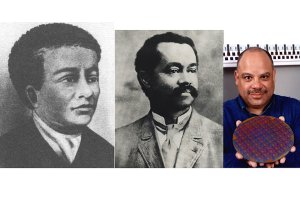Banneker was born into a family of free blacks in Maryland. He learned the basics of reading, writing and arithmetic from his grandmother and a local Quaker schoolmaster. However, most of his knowledge was self-taught. He is famous for accurately making a wooden clock after studying the inner workings of one. He finished it at age 21 and it worked faithfully, striking on the hour, until his death. In 1791, he was appointed to the District of Columbia Commission, which handled the survey work that established the city’s original boundaries. From there, he went onto to write and publish the Pennsylvania, Delaware, Maryland, and Virginia Almanac and Ephemeris. The books contained information on tides, future eclipses, and medicinal formulas. Benjamin Banneker has been coined the first African-Americans intellectual.
Charles Henry Turner (1867 - 1923)
Zoologist
In 1892, Turner became the first African-Americans to hold a graduate degree at the University of Cincinnati. In 1907, he also became the first African-Americans awarded a Ph.D. from the University of Chicago. Even though he had a doctorate, he chose to teach at high schools. It is thought that he did so in order to devote more time to the observation of insects. He published 49 papers on insects; titles of them include: Habits of Mound-Building Ants, Experiments on the Color Vision of the Honeybee, and Psychological Notes on the Gallery Spider. Because of his observation and research, Turner proved for the first time that insects could hear and distinguish pitch.
Mark Dean (1957 to Present)
Innovator & Computer Scientist
Dean was born in Jefferson City, Tennessee. He holds a bachelor’s degree from the University of Tennessee, a master's degree from Florida Atlantic University, and a Ph.D. from Stanford University – all in electrical engineering. He also holds three of the original nine IBM patents that brought about the IBM home personal computer. He led the team of IBM computer scientists that invented the ISA bus – the device enabled computer components to communicate to each other rapidly. This breakthrough made personal computers fast and efficient. He also led the design team that created the first one-gigahertz computer processor chip. For his contributions, he was inducted into the National Inventors Hall of Fame in 1997. He was also the first African-Americans to become an IBM Fellow, which is the highest level of technical excellence given at the company. Dean is still with IBM to this day as a Vice President. He oversees the company’s Almaden Research Center in San Jose, California.
37.7699 -122.467174
 Notable African-American scientists Benjamin Banneker, Charles Henry Turner and Mark Dean. Image Credit for Mark Dean: Stanford University.
Notable African-American scientists Benjamin Banneker, Charles Henry Turner and Mark Dean. Image Credit for Mark Dean: Stanford University.